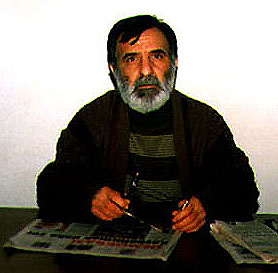Photo: Turkish editor Ocak Isik Yurtçu
From the Executive Director
Almost two years ago, Turkish editor Ocak Isik Yurtçu was sent to jail for publishing what the government called “separatist propaganda,” and what the rest of us would call news.
Unless we do something about it, he will stay there until the year 2009.
As everyone knows, a Turkish prison is no Club Fed. Earlier this year a Turkish reporter taken into police custody was beaten to death. Joining Yurtcu in Turkey’s journalistic gulag are dozens of other imprisoned reporters, editors, and publishers. In the 1990s, Turkey has consistently held more journalists in prison than any other nation on earth.
Once the charges against him were filed, Yurtçu could have easily fled into exile abroad. But he chose on principle to fight back, to stand trial and defend himself and his profession. He lost.
In a statement sent to CPJ from his prison cell, Yurtçu noted matter-of-factly that he was prosecuted “because I tried to learn the truth and relay this truth to inform the public: in other words, to do my job.”
Like many leaders of self-described democracies, Turkish authorities arrogate to themselves the right to determine what can and cannot be reported about their policies, their professional conduct, and even basic empirical facts about their national culture and politics.
Turkey’s particular obsession is controlling information about all things Kurdish. The most sensitive of these issues is the counterinsurgency campaign against Kurdish rebels. The government has virtually criminalized all reporting about the conflict that does not parrot army press releases. As editor in chief of the most important newspaper covering Turkey’s 12-million-strong Kurdish community, Yurtçu believed he was obligated to provide original, factual reporting about this semiclandestine internal war, while at the same time maintaining his paper’s traditional editorial dissent from the armed separatist cause. An essentially mainstream editor of a newspaper serving a marginalized minority, he had to choose between the needs of his readers and the demands of the state.
Yurtçu challenged the right of Turkish authorities to dictate his editorial agenda, and it cost him his freedom.
It also led to the demise of his paper: Özgür Gündem weathered a series of government-ordered closures, arrests, and confiscations of its issues before finally shutting down in April 1994. In defiance, the paper’s staff started other newspapers, but none were as balanced or as widely read, and all but one, Demokrasi, have also subsequently been forced to close.
CPJ is presenting a 1996 International Press Freedom Award in absentia to Yurtçu in overdue recognition of his professional valor and integrity. News of the award, he told us, is “a light of hope despite the surrounding prison walls and the deep darkness here.”
Our intent in bestowing the award is to try to get him out of that deep darkness. The presentation ceremony in New York on Nov. 26 marks the beginning of an intensive effort to persuade Turkish authorities that Yurtçu was unjustly imprisoned and should be released on humanitarian grounds.
Among the many imprisoned journalists in Turkey, Yurtçu is notable for both his professional stature as one of the leading figures of independent Turkish journalism and the cruel severity of his sentence. The two are not unrelated.
Still, Yurtçu protests that he is not unique. He stressed that he is accepting the award on behalf of all Turkish journalists who have faced imprisonment and other retributions for their coverage of the Kurdish conflict.
“As my colleagues struggle against all this pressure … and continue in a relentless effort to carry out their journalistic duties,” he wrote, “this award has special meaning because it shows that they are not alone, and will not be alone as they strive to report the truth.” We owe it to Yurtçu to prove through the intensity of our efforts on his behalf that he and his Turkish colleagues are indeed not alone.
